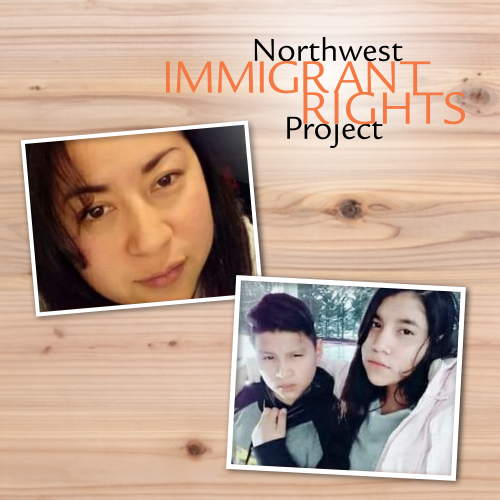 A cross-office Foster Garvey team diligently worked together to assist a family from El Salvador with obtaining administrative closure in a defensive asylum matter, after a more than six-year-long process.
A cross-office Foster Garvey team diligently worked together to assist a family from El Salvador with obtaining administrative closure in a defensive asylum matter, after a more than six-year-long process.
In 2016, Maritza Carolina Ventura de Rivas came to the United States with her son Iker (12) and daughter Génesis (13) to flee the atrocities of the gang violence plaguing daily life in their home country. While living in El Salvador, Iker was heavily pressured by the local gangs to serve as a lookout. When he refused, his uncle was forced to clean a car covered with blood, and Iker received repeated threats on his journey to and from school, including threats to rape his family members.
Fearing that this type of abuse would escalate into something far worse, the family sought an escape but lacked the resources to make a move of any kind. Eventually, the family received funding from Iker and Génesis' father to come to the United States.
Finding Refuge and Resources Through NWIRP
Upon moving to Washington state, Maritza and her children connected with the Northwest Immigrant Rights Project (NWIRP), an organization that promotes justice by defending and advancing the rights of immigrants through direct legal services, systemic advocacy and community education.
When they reached an immigration detention facility after first crossing the border into the United States, they were given credible fear screenings and, after the U.S. government determined they had a credible fear of persecution in their home country, they were released, eventually leading them to NWIRP.
Foster Garvey attorneys have partnered with NWIRP for decades, in both their individual capacities and participating in various clinics with the organization. The firm initially accepted Maritza and her children’s case, along with half a dozen others, through NWIRP’s asylum referral program.
A 2016 asylum training session sponsored by NWIRP and hosted by Foster Garvey led to the firm’s mass mobilization to provide critical aid to asylum seekers. This year proved to be a major inflection point for immigration and asylum law, with the legal landscape shifting dramatically over the following years. Closely monitoring these sea changes in the law, Foster Garvey attorneys and staff continued to provide dedicated services and support to their clients facing deportation and other immigration-related issues.
Uncovering Novel Pathways for Relief
Although memos issued under the Trump administration significantly narrowed the availability of asylum, new guidance under the Biden administration, including a publication known as the “Mayorkas Memo,” placed a new focus on prosecutorial discretion as an avenue to amnesty for certain asylum applicants. The Mayorkas Memo encouraged immigration court prosecutors – many of whom could not keep up with their growing caseloads in light of budget cuts and COVID-related court closures – to close or settle deportation cases against immigrants considered a low priority for agency resources (especially applicants who were not accused of crimes, not threats to national security and present in the United States for several years). The Foster Garvey team discussed this updated guidance with NWIRP, which encouraged the firm to also pursue a “U visa” for Iker and a derivative visa for his mother, to support a future request for prosecutorial discretion.
The U visa is an immigration benefit offered by the Department of Homeland Security and is available to victims of criminal activity who have assisted law enforcement in the investigation or prosecution of a crime. U visas provide these victims with nonimmigrant status, allowing them temporarily remain in the United States.
In 2017, one year after arriving in the United States, Iker had been assaulted by another teenager with a gun in Everett, Washington. The next day, the same teenager threatened others in a similar fashion and ended up shooting and killing another teen. Iker felt compelled to speak up about what had happened to him. Fortunately, Iker had a close relationship with the Spanish-speaking police officer in his middle school and was able to confide in him about the incident. With this background, the Foster Garvey team pursued the U visa, obtaining the relevant affidavit in support from law enforcement. The process to file took approximately six months.
During those six months, the Mayorkas Memo was temporarily invalidated by a Texas court. The team still filed a request for prosecutorial discretion, but, following guidance from front-line practitioners, specifically did not to refer to the Mayorkas Memo. The family’s initial court date had been set for 2017, then was postponed to 2020, and ultimately pushed back even further to February 2023 as a result of the pandemic.
A Positive Outcome and a Brighter Future for the Family
Weeks before the hearing, the U.S. government agreed to administratively close the case, eliminating any immediate threat of deportation, and permitting Maritza, Iker and Genesís to remain in the United States indefinitely. While administrative closure does impact the family’s ability to obtain permanent resident status with a Green Card through the asylum process, the family’s pending U visa application is still a potential path to a Green Card and eventual naturalization. Additionally, all three family members are eligible for work authorization in the meantime because their asylum applications technically remain pending.
Today, both Iker and Génesis have graduated from high school, have steady jobs and have ambitions for attending higher education. Given the complexities of this case, multiple Foster Garvey attorneys worked on the matter over the years and had to keep up with rapidly changing legal and pandemic-related conditions, but the end result was as favorable as possible under the circumstances. The case exemplifies the firm’s deep commitment to its pro bono clients, and the firm continues to work with the family on renewing their annual work permits and other next steps.
The team working alongside NWIRP in this matter includes Malcolm Seymour (Litigation Principal, New York) and Silviya Borroff (Immigration Paralegal, Seattle).

